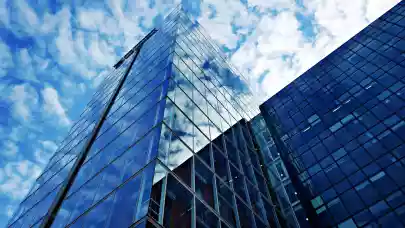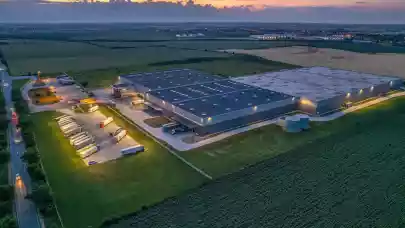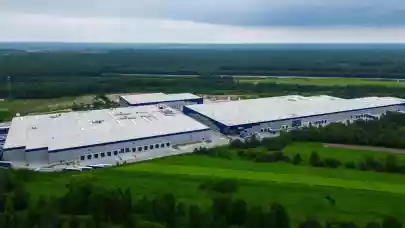
Adrian Biesaga, Board Member and Head of Development of Polish logistics developer LCube talked to Property Forum about the changes forced by pandemic on the warehouse market, the “big box” segment and ecological solutions in construction.
Poland’s post-pandemic warehouse market is „red hot” – developers and investment funds have never been so active. Is it difficult for newcomers to gain a foothold in this market?
Although LCube was established as an entity operating on the warehouse market relatively recently, the people who make up our team have been present on the warehouse market for years. I have been involved in the real estate industry for over 16 years. During this time, I have gained invaluable experience and watched how this market evolves. Changes in the last year, which were accelerated by the pandemic, brought on new challenges and led us to make a decision. We have started preparations for our own development project. In our company, there is a willingness to organize the project in a way that meets not only our expectations but also supports the effectiveness of our cooperation with partners and associates to meet shared goals. In LCube’s establishment, we’ve maintained that a crucial element is for us to see opportunities for development on the market – this has become even more obvious with the warehouse market boom. Thanks to our flat structure, we can react extremely quickly and always be close to our partners. Positive feedback from funds and banks only confirms that we are going in the right direction, and LCube has a chance to rise to the top and thrive as a leading company in logistics real estate.
Currently, financial institutions and funds seem very eager to finance warehouse projects. I understand that gaining investment financing is not a problem for LCube?
LCube is a developer of warehouse and logistics space, which, by offering modern solutions and services on the warehouse market, focuses primarily on the needs of the tenant. A distinguishing feature of our company is the excellent knowledge of the warehouse space market; whether that be regarding investment locations, relationships with architects and contractors, or approaches to tenants, whose needs are always put first. In our business, we focus on relationships with partners. Financial institutions know us, and know that we are perfectly oriented in this market, so there is no barrier for us when it comes to trust or competence. Of course, the current warehouse boom is helpful, but we are not only concerned with the “here and now”. Rather, our perspective involves looking ahead at least several years, which allows us to more easily obtain financing for the first projects.

Adrian Biesaga
Board Member, Head of Development
LCube
Covid-related turmoil has boosted the development of e-commerce and the demand for last-mile city logistics. How permanent do you think this trend is? Do you predict a return to the status quo and “big box” warehouses after the pandemic?
The big box warehouse segment is developing steadily. Of course, we can see so-called city logistics growing dynamically, but at a similar level to the big box market. This is due to the still persistent deficit of large space taken up by the e-commerce industry. Some companies, tempted by lower rates, may also move their central warehouses from our western border to central Poland. Today, 70 percent of tenants in spaces larger than 50,000 sqm are e-commerce companies - this is unprecedented and shows that there are changes not just in the warehouse industry, but around the world.
Smaller facilities, which are often built within cities, complement supply chains and in my opinion there will still be demand for them. At the same time, I also see a risk in the form of rising plot prices, which may inhibit this trend in the coming years. I would expect a rather stable development of both of these segments. In my opinion, COVID has not caused any drastic changes on the market. These trends were already visible before the pandemic. COVID only accelerated these changes, hence my belief that they will become permanent in the future.
Prices for land are skyrocketing, so many developers are considering new projects on brownfields. Maybe the solution to this problem could be building in new, cheaper and less obvious locations?
The warehouse industry is inextricably linked with logistics. As such, any new facilities must be built near excellent transport infrastructure. Ideally, it would also be set in proximity to strong urban centres. We are constantly monitoring the market and looking for new locations. For example, we have a new investment near Wrocław, where construction of a bypass is underway. We expect that the construction plans for 100 ring roads in Poland, (which is already approved), should stimulate the development of Poland’s warehouse industry in the near future. In fact, PLN 28 billion will be allocated for this purpose over the next 10 years. If we add to this the Via Carpatia route, which is currently under construction, we have an image of not only a large construction site but also of new markets opening for our industry. When it comes to post-industrial areas, we also compete with housing developers here. Given this, I do not expect too many new investments in such areas, however, this will depend on specific locations and levels of demand in the coming years.
Demand for BTS warehouses in the next 24 months – is it on the rise or dwindling?
As seen in data regarding demand and new contracts, we are dealing with a never-before-seen boom on the warehouse market. In mid-2021, the level of warehouse space under construction amounted to over 3.1 million sqm - which is an absolute record. In addition, the largest contracts concluded on the market concerned BTS facilities. Currently, only about 30 percent of the entire market space under construction is awaiting a lease agreement. Many contracts are concluded well in advance and for space that is under construction or will be released within a few months. In addition, we believe that record-low vacancy rates will drive the boom for BTS warehouses further, as each tenant has their own unique preferences that are easier to implement at the design stage than later, once the facility is completed. Therefore, we can expect demand for BTS facilities to remain high in the coming months.
Ecological solutions in warehousing construction – a real expression of our influence on the natural environment or just greenwashing?
We want our investments to be distinguished for their ecological solutions. In our facility near Wrocław, we foresee electric car charging stations at a minimum. Current plans also include the creation of honey-bearing meadows, as well as the facility itself being certified.
I believe that today, for future-geared entities like ours, the implementation of such solutions is a necessity. Of course, tenants look at amenities, but the most important factor remains financial – rental rates, discounts and service quality, including the amount of operating costs. However, a growing priority for facility owners is the time value of their investment. I believe that this trend is inevitable and soon what is often perceived today as a marketing gimmick will become the standard. Investments lacking ecological solutions will simply be priced lower and will have to bear the necessary investment costs. Therefore, companies looking to build the value of their portfolio, need to look beyond quick speculative profit. LCube strives to be such an entity, and the implementation of environmental standards and "green" certificates are a necessity for more reasons than one.
What are LCube’s investment plans for the near future?
LCube's nearest upcoming investment is an industrial and warehouse park being built in Jasionka, near Rzeszów. In the first stage, we will deliver 5.7 thousand sqm of modern class-A warehouse space, which will be available in the third quarter of this year. We have already started the commercialization of this investment. We expect great interest from tenants, which will enable the project launch of the second stage with an area of approx. 20,000 sqm.
Another project that we will implement is Logistic Park Wrocław, which will offer about 60 thousand sqm. The two-stage investment is carried out in a joint venture with the Sindbad Group. The first warehouses in Dobrzykowice near Wrocław will be available for lease heading into 2022.
We are also conducting talks for the purchase of additional land and locations throughout Poland.



